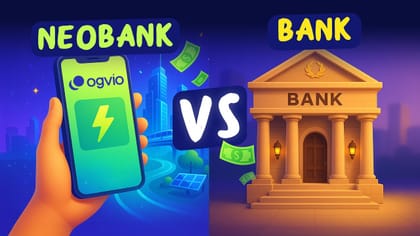Key Takeaways
- There are several methods on how to transfer money from crypto to bank account: using a crypto exchange, peer-to-peer (P2P) marketplaces, crypto wallets, and crypto debit cards;
- It's essential to know how to withdraw crypto to bank account if you want to use the funds for purchases or expenses;
- When trying to withdraw your asset, always be careful of the security threats and consider the tax implications.
Stop overpaying - start transferring money with Ogvio. Sign up, invite friends & grab Rewards now! 🎁
You've probably already dipped your toes into the cryptocurrency world and gathered some digital assets! Now, you might be considering how to transfer crypto to bank account and access those funds in a more traditional way.
You've come to the right place! I'll provide you with step-by-step guides on transferring crypto to your bank account. In just a few simple steps, you'll be on your way to using your crypto for real-world purchases or simply having easy access to your cash.
I’ll use Ogvio and Kraken as examples because I like their user-friendly approach. However, you can always proceed with your preferred exchange, like Binance or Bybit, or use another method that I’ll explain below.

Did you know?
Subscribe - We publish new crypto explainer videos every week!
What Is a Neobank (And Should You Use It)?


Table of Contents
- 1. The Process of Transferring Crypto to a Bank Account
- 1.1. Choosing the Right Platform
- 1.2. How to Transfer Crypto to a Bank Account Using Ogvio?
- 1.3. How to Transfer Crypto to a Bank Account Using Kraken?
- 2. Why Do People Withdraw Their Crypto to a Bank Account?
- 3. Considerations and Tips
- 4. Common Issues and Troubleshooting
- 4.1. Entering the Wrong Address
- 4.2. Delayed Transfers
- 5. Conclusions
The Process of Transferring Crypto to a Bank Account
Let's just jump right in on how to transfer crypto to your bank account! First, I'll talk about different methods you can use and then continue with step-by-step instructions. Along the way, you'll find useful tips on how to choose the right method for you, minimize withdrawal fees, and more.
Latest Deal Active Right Now:Choosing the Right Platform
Transferring your cryptocurrency to cash (fiat currency like USD or EUR) can be done in a few different ways, each with its own advantages and considerations. Here's a breakdown of some popular options:
Neobank
One of the newer ways people can transfer their crypto to a bank account is through a neobank that also supports cryptocurrencies. There aren't many options yet, but one of the best is Ogvio.

With this platform, you can easily convert USDC on the Base chain to your desired fiat currency, all done while sending it to a bank account.
Pros:
- Quick bridge from USDC to spendable money in a single app, instead of juggling exchange and banks.
- Broad global coverage and multi-currency support, with balances pegged to USD/EUR to soften local currency volatility.
- Simple pricing model: no crypto transfer fees on Ogvio's side in many cases, while bank transfer fees are competitive and shown upfront.
- Strong security (on-chain vaults, AES-256 encryption, non-custodial design, more) while still feeling like a familiar fintech app.
Cons:
- Still a new product, with features like Ogvio Card or business tools scheduled for later.
📚 Read More: Ogvio Review
Cryptocurrency Exchanges
This is a common and convenient option for many users when searching how to transfer crypto to bank account easily. Cryptocurrency exchanges like Binance, Bybit, and Kraken allow you to sell crypto for fiat currency in just several steps. Some also let you initiate a withdrawal directly to your bank account.
Pros:
- Simple and user-friendly interface;
- Secure platforms with established reputations;
- Often offer a variety of cryptocurrencies for selling.
Cons:
- Transaction fees can vary depending on the exchange and the chosen withdrawal method;
- Most exchanges have minimum withdrawal amounts.
Peer-to-Peer (P2P) Marketplaces
If you don’t have time to find out how to transfer money from crypto to bank account yourself, consider P2P marketplaces like the one offered by Binance.

This method connects you directly with other users who want to buy or sell crypto. You can agree on a price and payment method (bank transfer, cash deposit, etc.) directly with the other party.
Pros:
- Potentially lower fees compared to exchanges;
- Better flexibility in payment methods.
Cons:
- Requires more effort to find a suitable buyer and agree on terms;
- May involve meeting someone in person, depending on the chosen payment method;
- Higher potential for scams compared to established exchanges.
Crypto Wallets
Some crypto wallets, like the Coinbase Wallet, allow you to sell your crypto directly within the wallet interface. If you already store the asset in a specific wallet, this can be a convenient option to complete the process on how to transfer money from crypto to a bank account.
Pros:
- Can be a convenient one-stop shop for managing and selling your crypto;
- Some wallets offer competitive exchange rates.
Cons:
- Limited selection of cryptocurrencies and fiat currencies compared to dedicated exchanges;
- May impose higher fees for selling compared to other options.
Crypto Debit Cards
Crypto debit cards, offered by platforms like Bybit or Coinbase, allow you to spend your cryptocurrency directly at merchants or withdraw cash from ATMs.

Pros:
- Direct access to your crypto for everyday purchases;
- Removes the need to convert to fiat currency before spending.
Cons:
- Transaction fees might apply when using the card;
- Some cards might have limitations on daily spending or ATM withdrawals;
- Not all merchants accept crypto debit cards yet.
When deciding how to transfer crypto to a bank account, consider your individual needs and priorities. Also, make sure to think about such essential factors as fees, convenience, security, and speed. Understanding the different transfer options and their pros and cons can help you make an informed decision about the best way to convert your crypto to cash and access your funds.
How to Transfer Crypto to a Bank Account Using Ogvio?
Now, let's start with a quicker, simpler, and potentially cheaper method. I'll be using Ogvio and Kraken (withdrawing from Kraken to Ogvio and then to a bank account).
There are zero fees for crypto transfers to Ogvio, so you'll only need to cover them on Kraken's end. Plus, it offers very competitive bank transfer fees, often with instant transactions.

![How to transfer crypto to bank account: a red arrow pointing to the [Add Money] button on Ogvio. How to transfer crypto to bank account: a red arrow pointing to the [Add Money] button on Ogvio.](https://assets.bitdegree.org/images/how-to-transfer-crypto-to-bank-account-ogvio-step-2.jpg)
![How to transfer crypto to bank account: a red arrow pointing to the [See Your Wallet Address] option. How to transfer crypto to bank account: a red arrow pointing to the [See Your Wallet Address] option.](https://assets.bitdegree.org/images/how-to-transfer-crypto-to-bank-account-ogvio-step-3.jpg)





After all that, the last touches will be entering the amount, reviewing, and making the withdrawal.
![How to withdraw crypto to bank account: the [Send Money] button on Ogvio. How to withdraw crypto to bank account: the [Send Money] button on Ogvio.](https://assets.bitdegree.org/images/how-to-transfer-crypto-to-bank-account-send-money-ogvio.jpg)


All fees for converting USDC to your chosen fiat currency will be shown before you complete the bank transfer, and Ogvio will handle the entire process.
How to Transfer Crypto to a Bank Account Using Kraken?
Now, let's talk about how to do it from Kraken directly. It's a crypto exchange that offers a wide range of features, crypto and fiat options, and competitive fees. What I like most about Kraken is that it has an easy step-by-step method to withdraw fiat currency, which makes the process clear and user-friendly, even for beginners.
If you have signed up for another exchange (like Binance, for example), the process of how to withdraw crypto to your bank account from it will be somewhat similar. Binance is a popular option, for sure! In fact, it's among the top crypto exchanges by daily trading volume[1].

FYI, some platforms may automatically detect the currency based on the personal data the users include in the account setup process.
- ACH. This is a popular option in the United States for electronically transferring funds between bank accounts. It's generally a slower but cheaper method compared to wire transfers.
- MVB Bank (Wire). This is a wire transfer option facilitated through MVB Bank. Wire transfers are typically faster than ACH but come with higher fees.
- Customers Bank (Fedwire). Similar to MVB Bank transfers, this option uses the Fedwire network for faster withdrawals but might incur higher fees.
- Bank Frick (SWIFT). It uses the SWIFT international banking network for international transfers. SWIFT transfers can take longer than domestic options but are suitable for sending funds to your bank account in another country.
Which one should you choose to complete the process on how to transfer crypto to a bank account? The answer depends on your priorities.

I chose the ACH option because it’s cheaper. Just keep in mind that the daily cutoff time is at 3:00 pm ET. Also, ACH transfers initiated on weekends or holidays won't be processed until the next business day.
Another common question asked is, "What about fees?". Well, these also depend on the platform, method you choose, banks involved, and the amount of crypto being transferred. Possible fees involved in the process include transaction, withdrawal, and conversion fees.
On Kraken, there is a minimum requirement for each withdrawal according to the cryptocurrency you want to withdraw and a fee to cover the transaction costs of moving the asset out of your account.
“Is there any method to minimize fees?”, you might ask. My answer is yes!
Besides comparing the fee structures of different crypto exchanges and choosing the right withdrawal method, try to group your withdrawal instead of making multiple small withdrawals. Making your crypto transfers into fewer, larger transactions can help minimize the per-transaction fees you incur.

Some exchanges also offer fee discounts for using their native tokens (cryptocurrencies created by the platform) to pay for transaction fees. Explore this option if it's available and makes sense for your situation.
Once again, remember that several platforms may have different processes and requirements. Some exchanges, like Bybit, for example, require users to do an internal transfer from the trading account to the funding account; only then can they convert crypto to fiat currency.

In this step on how to transfer crypto to a bank account, remember to always double-check everything, so you don’t accidentally send it to the wrong bank account.
Kraken requires you to only use a bank account under your control. This means the name on the bank details must match the verified name or entity on the Kraken account. Also, make sure you’re not withdrawing to a third-party payment processor, such as a company that offers payment-processing services to merchants.
Next, enter a description that’s memorable and unique (you haven’t used it for any withdrawal method on your Kraken account). When ready, click Add Bank Account.

The processing times depend on various aspects. The exchange might take some time to verify and approve your withdrawal request. Once the exchange releases the funds, it can take additional time for your bank to process and credit the deposit to your account. This timeframe can vary depending on your bank's internal procedures.
If you choose ACH transfers, it might take 3-5 business days to appear in your bank account, while wire transfers could be processed within 1-2 business days.
Why Do People Withdraw Their Crypto to a Bank Account?
After learning the steps on how to transfer crypto to a bank account, you might wonder why people do this in the first place. There are several reasons why people might withdraw their assets.
Cashing Out Gains
If their crypto values increase a lot, they might want to sell it and withdraw the money to their bank account to lock in those profits. They're basically saying, "I'm happy with the money I've made on this crypto, so I'm going to sell it and put the cash in my bank account where it's readily available."
The value of cryptocurrency can fluctuate wildly, meaning it can go up quickly but also come down just as fast. Selling after a price increase allows people to secure the profits they've made and avoid the risk of the price dropping again.
Personal Purchases

People want to know how to deposit crypto into a bank account, maybe because they want to use the asset for a vacation, a down payment on a house, or simply need more cash on hand for everyday expenses like bills and groceries.
Withdrawing to a bank account makes it easier to access and use the money for these purposes as cryptocurrency isn't typically accepted for such transactions.
Investment Diversification
Some people might want to diversify their portfolio by learning how to withdraw crypto to a bank account to buy more traditional assets like stocks or bonds. These traditional assets tend to be less volatile than crypto.
Having a mix of crypto and traditional assets helps people balance risk and reward. Yes, crypto has the potential for high returns, but also carries a higher risk of losing value. Traditional assets might offer lower but more stable returns. Diversification means they’re not overly reliant on the ups and downs of any single asset class.
Regulatory Compliance and Tax Payments
Another reason people want to know how to transfer money from crypto to a bank account is for tax and regulatory purposes.

Cryptocurrency is a relatively new asset class, and tax laws surrounding it are still evolving. Some countries might start charging taxes on crypto gains or change the rules about how to report the asset. A government may also restrict access to certain cryptocurrency exchanges or limit the amount of crypto an individual can hold.
For example, China banned all activities related to token sales, crypto assets, and token exchanges in 2017 before it issued a blanket ban on all crypto transactions and mining in 2021[2].
Therefore, transferring crypto to a bank account allows people to avoid any potential complications or penalties caused by new regulations. Even if governments restrict access to crypto exchanges or limit how much crypto they hold, the asset transferred to the bank account is safe, clear, and easy to report for taxes.
Considerations and Tips
When trying to understand how to transfer crypto to a bank account, it's crucial to understand the security considerations involved. Unlike traditional bank transfers, cryptocurrency transactions are largely irreversible, so making sure you keep the assets safe is important.
Moreover, there are security threats like phishing scams, malware, and account takeovers when someone tries to withdraw their crypto.
Phishing scams are one of the biggest threats in the crypto world. These scams involve tricking people into giving up their crypto wallet information, allowing attackers to steal their funds. In fact, this kind of threat makes up over half of all cybercrime targeting Ethereum users since 2017[3]. This shows just how common and dangerous these scams can be.
Thankfully, there are ways to protect yourself. One security measure to keep in mind is two-factor authentication (2FA). This adds an extra layer of security to your accounts by requiring a second verification code in addition to your password when logging in.

Many popular cryptocurrency exchanges, like Binance, already offer 2FA as an option. Consider using a trusted authenticator app like Google Authenticator instead of SMS verification for better security.
Another line of defense is a secure crypto wallet to have your crypto stored safely before you know how to transfer crypto to a bank account.
Generally, hardware wallets like Ledger Nano X offer top-notch security. They store your crypto offline, making them highly resistant to online attacks. This is ideal if you plan on holding your crypto for a long time or have a big amount. However, hardware wallets can be less convenient for frequent transfers as you need to connect them to your computer each time.
Meanwhile, software wallets are digital wallets (like Binance and Coinbase Wallet) that offer a more convenient solution for frequent transfers. You can access these through your phone or computer, making it easier to initiate the transfer process to your bank account. The trade-off? Software wallets are typically considered less secure than hardware wallets because those are connected to the internet.

Besides security threats and measures, you should consider tax implications when understanding how to transfer crypto to a bank account.
Cryptocurrency transactions can have tax implications depending on your location and how you use your crypto. Selling crypto for a profit might trigger capital gains taxes. Additionally, some countries might tax crypto received through mining or staking. It's crucial to understand your potential tax obligations before transferring crypto to your bank account.
You can simplify the tax filing process by maintaining accurate records of all your crypto transactions (purchase price, sale price, dates, etc.) is essential for tax reporting purposes. Many crypto exchanges and wallets can provide transaction history data, but keeping your own records is always a good practice.
However, crypto tax laws are still evolving, and the specifics can vary depending on your situation. For detailed tax advice specific to your circumstances, it's best to consult a qualified tax professional who is familiar with cryptocurrency regulations. They can help you understand your tax obligations and ensure you are filing your taxes correctly.
Common Issues and Troubleshooting
When you're looking at steps on how to transfer crypto to a bank account, the process may seem straightforward at first glance. However, be aware because sometimes things don't go as planned.
Entering the Wrong Address
One of the most common mistakes when people learn how to deposit crypto into a bank account is entering the wrong bank account information during the transfer process. Unfortunately, once you hit "send" on your crypto transaction, it's usually gone for good.
To prevent this from happening, always double and triple-check all your bank account details (account number, routing number, etc.) before initiating the transfer.
Also, many cryptocurrency exchanges and wallets allow you to save frequently used addresses in a contact list. If you’ve withdrawn your asset, use this feature to help prevent mistakes when manually entering addresses each time.
If you transfer from a mobile wallet, use QR code functionality whenever possible. Scanning the recipient's QR code ensures the address is entered accurately.

Remember: Most platforms won't allow you to reverse a transfer sent to an incorrect account, and retrieving the funds can be a complex process.
However, what to do if you accidentally enter the wrong address when following the steps on how to withdraw crypto to a bank account? Recovering funds can be tricky, but you can still take some steps to try and get them back.
First, contact your exchange support. Explain the situation and provide the incorrect address you mistakenly entered. In rare instances, especially if the transfer hasn't been processed yet, the exchange might be able to intercept it. Still, keep in mind that exchanges are not obligated to help, and success is not guaranteed.
If the transaction is confirmed on the blockchain, trace it using a blockchain explorer (a tool to view blockchain transactions). This can help identify the type of address you send it to (e.g., another exchange or a personal wallet). While it may not help you recover the funds directly, it can provide some information about where your money ends up.
If the blockchain explorer reveals the address belongs to another exchange or service, try contacting them directly. Explain the situation and see if they can help return your funds. Let’s hope for the best that the recipient is willing to cooperate!

Did you know?
Subscribe - We publish new crypto explainer videos every week!
What is Balancer in Crypto? Beginner Friendly BAL Explainer



- Secure and reliable
- Accepts fiat currencies
- Lots of trading options
- Reputable exchange
- Accepts fiat currencies
- Offers various trading options

- Huge trading variety
- Regulation-compliant around the globe
- Fair trading fees
- Beginner-friendly
- A wide array of features
- Vast number of different crypto coins & tokens

- Beginner-friendly
- Secure
- Decent trading and withdrawal fees
- Crypto.com Visa Card
- Automated tools & bots
- Ecosystem synergy with CRO
Delayed Transfers
Let’s say you’ve followed through the method of how to deposit crypto into a bank account and initiated the transfer. However, the number on your bank account doesn’t increase. While frustrating, there are a few reasons why this might happen:
- Network congestion. Just like rush hour traffic on the road, cryptocurrency networks can experience periods of high activity. This can lead to a backlog of transactions waiting to be processed, causing delays in your transfer.
- Exchange processing time. Cryptocurrency exchanges might have internal processing times for withdrawals. These can vary depending on the platform and the verification procedures in place. Be sure to check the exchange's estimated transfer times before initiating the withdrawal.
- Bank processing. Once your crypto arrives at the exchange's end, it might need additional processing by your bank before appearing in your account. This can take a few business days, depending on your bank's internal procedures.
In most cases, a delayed crypto transfer isn't alarming. Be patient and allow some extra time for processing, especially during periods of high network traffic.
Most cryptocurrency exchanges provide tools to track the status of your withdrawal, so you can get an idea of where your crypto is in the transfer process. Blockchain explorers can also help trace the movement of your funds.
If the delay seems excessive or you're unsure about the status of your transfer, don't hesitate to contact the customer support team of the cryptocurrency exchange you used. They might be able to investigate the issue and provide you with an update.
Conclusions
By following this guide and understanding the different options available, you've now equipped yourself with the knowledge on how to transfer crypto to a bank account confidently!
Remember, prioritizing security is key, whether you choose a user-friendly platform like Kraken (as used in my example) or another exchange that suits your needs.
Always double-check the data you enter because sending assets to the wrong address can be a nightmare as it’s challenging to get it back. Additionally, consider any regulations in your location that might apply to cryptocurrency transfers. These regulations can vary by country, so familiarizing yourself with them can help ensure a smooth and compliant experience.
The content published on this website is not aimed to give any kind of financial, investment, trading, or any other form of advice. BitDegree.org does not endorse or suggest you to buy, sell or hold any kind of cryptocurrency. Before making financial investment decisions, do consult your financial advisor.
Scientific References
1. M. Disli, F. A. Rabbo, T. Leneeuw, et al.: ‘Cryptocurrency Comovements and Crypto Exchange Movement: The Relocation of Binance’;
2. A. Ferreira, P. Sandner: 'EU Search for Regulatory Answers to Crypto Assets and Their Place in the Financial Markets’ Infrastructure';
3. M. Ghosh, D. Ghosh, R. Halder: ‘Investigating the Impact of Structural and Temporal Behaviors in Ethereum Phishing Users Detection’.









